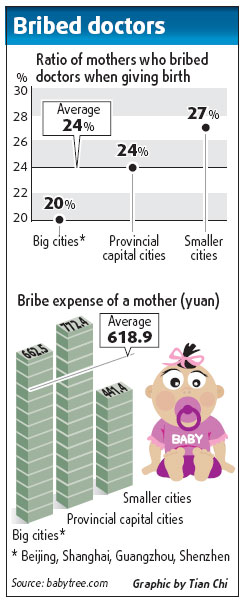Twenty-four percent of Chinese mothers gave hongbao (red envelopes with money) to doctors before they delivered children to ensure that they receive better care during birth, a survey showed.

The envelopes contained an average of about 620 yuan ($90), according to the random sampling survey released on Tuesday.
The survey interviewed 1,227 pregnant women and mothers with children aged 1 to 6 years old in cities nationwide.
Wang Zaoxia, a mother of a one-month-old baby from Taiyuan, capital city of Shanxi province, said that giving money to doctors before the birth of a baby is a common practice.
"I gave 1,500 yuan to the doctor and 500 yuan to the anesthetist before giving birth, which is relatively expensive because I had difficulty giving birth and had to accept cesarean section," she said.
During her delivery, she hardly felt any pain because the anesthetist gave her a better anesthetic, she said. Also, the doctor stitched her wound very carefully, she said.
But one of her friends suffered great pain when she gave birth, and she said she believes this might have been because she did not give the doctors money, she said.
"Mothers give the money in the hope of having a smooth and painless delivery," she said.
In China, giving red eggs, a symbol of Chinese gratitude, to doctors, family and friends after a baby's birth, is a traditional custom.
But now the gifts to doctors often come before the birth.
"Parents have the right to give money or gifts to thank doctors for a smooth delivery," said Qin Jiong, professor with the department of pediatrics from No 1 Hospital of Peking University.
But doctors should not receive the money, he said.
"The act (giving money to doctors) does exist across the country, but is not common in big cities like Beijing," said Sun Xiaomei, professor with the Chinese Women's College.
She also doubted the survey's credibility. "The sample size - 1,227 women - was far from enough to make a scientific survey," she said.
The survey was conducted by domestic child rearing website Babytree.com and technically supported by market intelligence solutions provider Global Market Insite Inc (GMI).
The research also found that Chinese parents on average spend about 20 percent of their monthly income on the child.
(China Daily June 27, 2009)